Unit 12 Life is full of the unexpected Section B小阅读 课件人教版初中英语九年级全册(共51张PPT)
文档属性
| 名称 | Unit 12 Life is full of the unexpected Section B小阅读 课件人教版初中英语九年级全册(共51张PPT) | 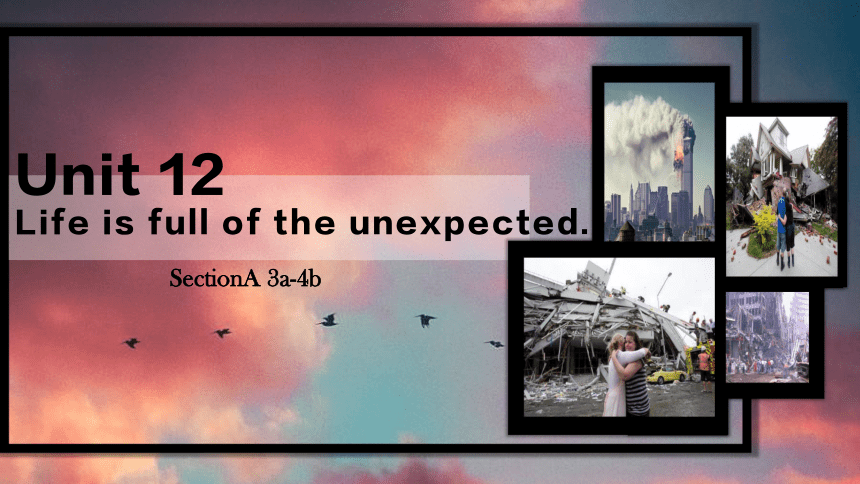 | |
| 格式 | pptx | ||
| 文件大小 | 47.7MB | ||
| 资源类型 | 教案 | ||
| 版本资源 | 人教新目标(Go for it)版 | ||
| 科目 | 英语 | ||
| 更新时间 | 2022-09-01 15:11:29 | ||
图片预览

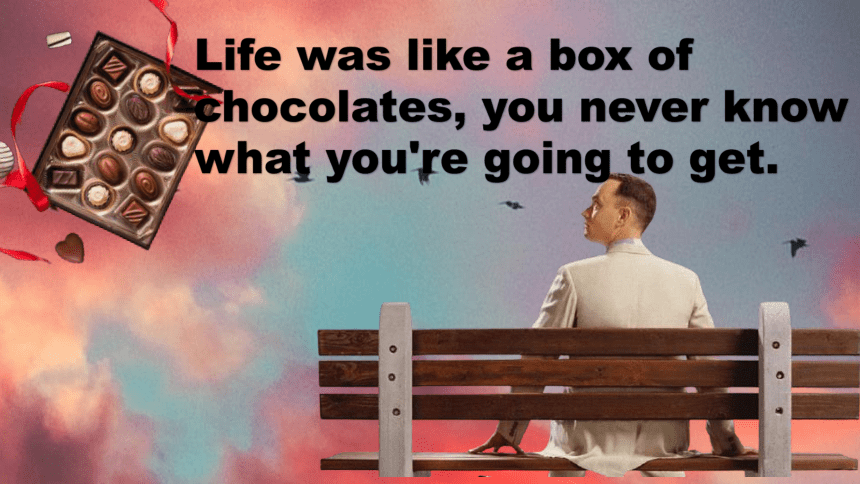

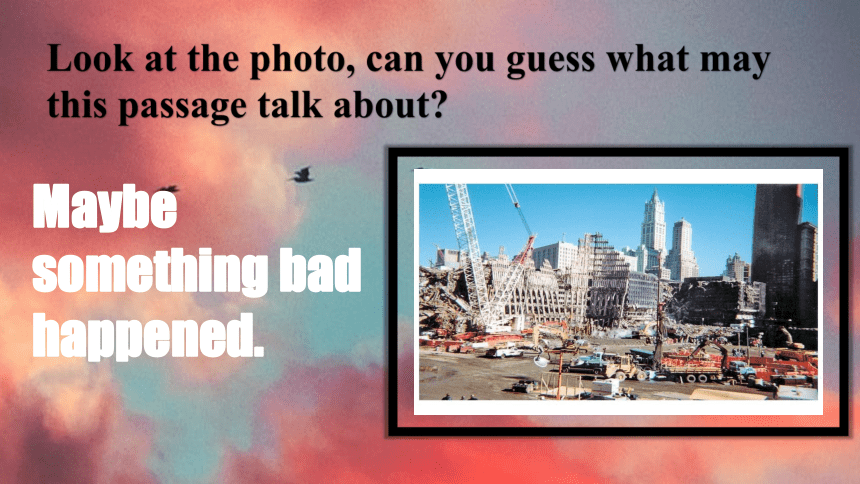
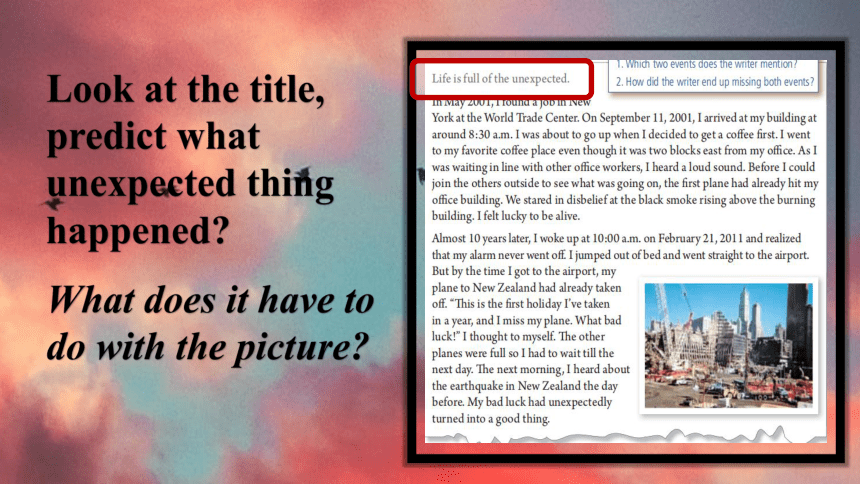
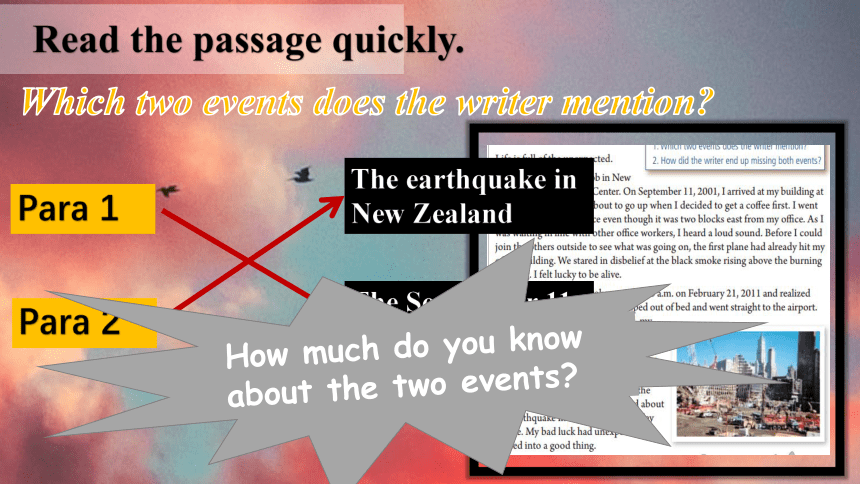
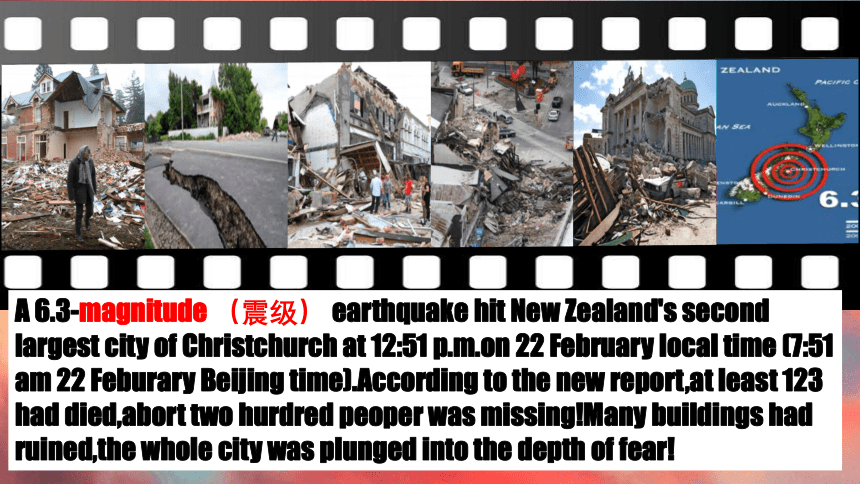
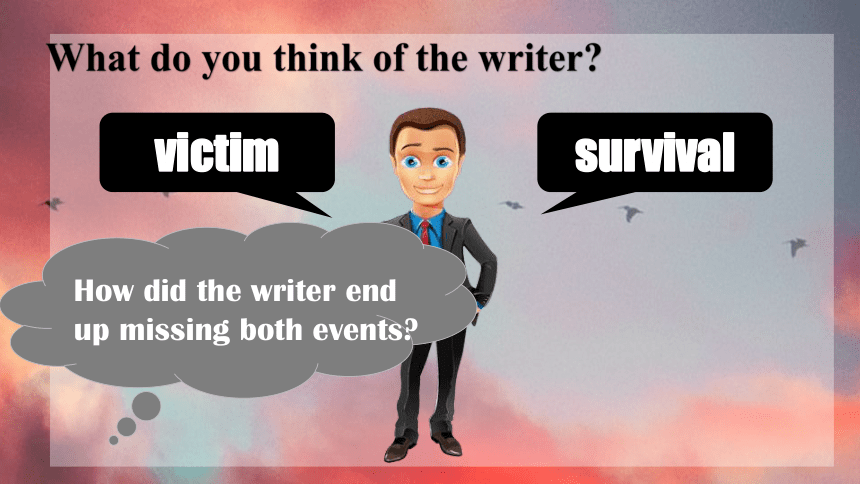
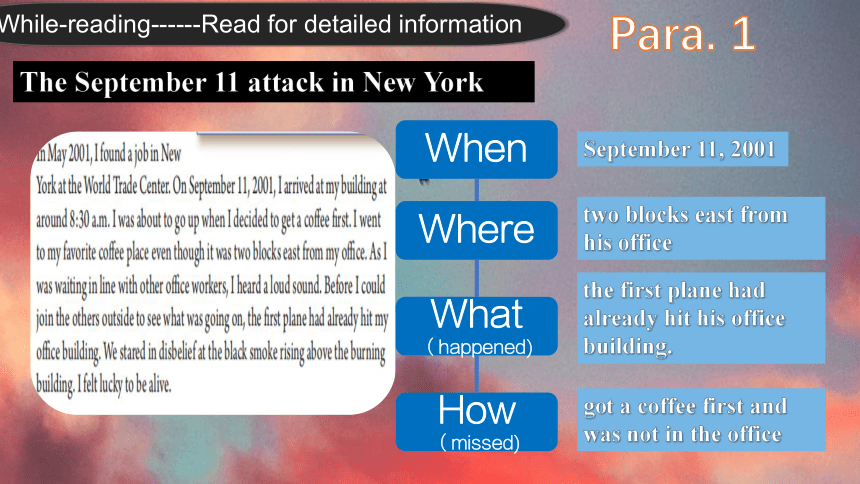
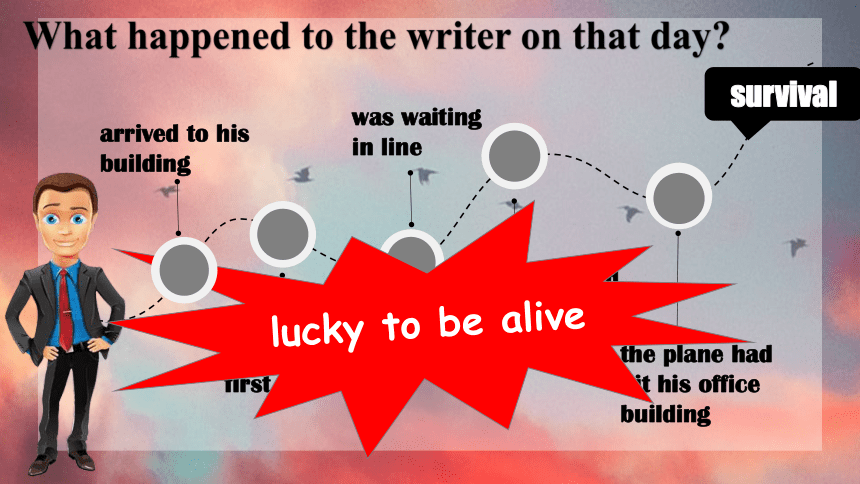
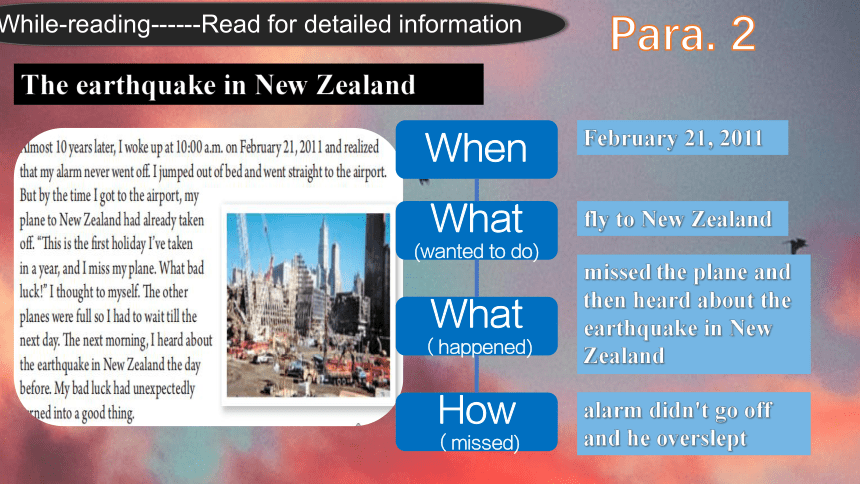
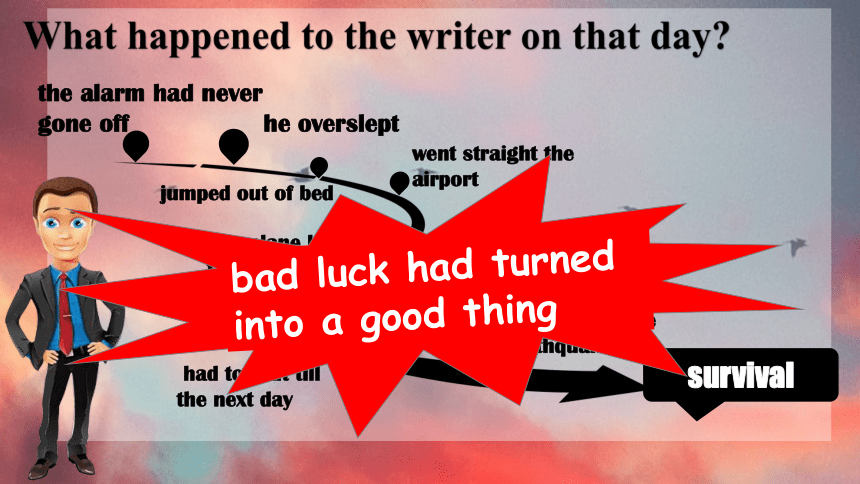
文档简介
(共51张PPT)
SectionA 3a-4b
Unit 12
Life is full of the unexpected.
Life was like a box of
chocolates, you never know
what you're going to get.
Sometimes
the bad thing what you think
is not necessarily
a bad thing.
Life is full of the unexpected.
Look at the photo, can you guess what may this passage talk about
Maybe something bad happened.
Look at the title, predict what
unexpected thing happened
What does it have to do with the picture
Read the passage quickly.
Which two events does the writer mention
Para 1
Para 2
The earthquake in New Zealand
The September 11 attack in New York
How much do you know about the two events
A 6.3-magnitude (震级) earthquake hit New Zealand's second largest city of Christchurch at 12:51 p.m.on 22 February local time (7:51 am 22 Feburary Beijing time).According to the new report,at least 123 had died,abort two hurdred peoper was missing!Many buildings had ruined,the whole city was plunged into the depth of fear!
What do you think of the writer
survival
victim
How did the writer end up missing both events
While-reading------Read for detailed information
The September 11 attack in New York
Para. 1
When
Where
What(happened)
How(missed)
September 11, 2001
two blocks east from his office
the first plane had
already hit his office
building.
got a coffee first and was not in the office
What happened to the writer on that day
arrived to his building
got a coffee first
was waiting in line
heard a loud sound
the plane had hit his office building
survival
lucky to be alive
While-reading------Read for detailed information
The earthquake in New Zealand
Para. 2
When
What
(wanted to do)
What(happened)
How(missed)
February 21, 2011
fly to New Zealand
missed the plane and
then heard about the earthquake in New Zealand
alarm didn't go off
and he overslept
What happened to the writer on that day
survival
the alarm had never gone off
he overslept
jumped out of bed
heard about the earthquake
his plane had took off
had to wait till
the next day
went straight the airport
got to the airport
bad luck had turned into a good thing
Life is full of ______________.
February 21,2011
felt lucky to be alive
The September 11 attack in New York
The earthquake in New Zealand
September 11,2001
events
Time
Process
Feeling
bad luck had turned into a good thing
the expected
①arrived at my building
②decided to get a coffee
first
③was waiting in line
④heard a loud sound
⑤the first plane had already
hit my office
①my alarm had never gone off
②jumped out of bed and went
straight to the airport
③my plane had already
taken off
④had to wait till the next day
⑤heard about the earthquake
Finish the mind map.
What do you think of the writer
unlucky
lucky
How should we deal with the unexpected things correctly
Face
what we have to face
Change
what we can change
whatever we meet
Smile
Try
to be more optimistic
Life can be good,
Life can be bad,
Life is mostly cheerful(欢乐的),
But sometimes sad.
Life can be dirty,
Life can even be painful;
But life is what you make it,
So try to make it beautiful.
Even though life is full of the unexpected,
life also is full of hope and energy.
3b Find words from the passage with opposite meaning to the words below.Then write a sentencewith each word.
1. lost : ________ ____________________________________
2. west : ________ ____________________________________
3. below : ________ ____________________________________
4. dead : ________ ____________________________________
5. empty : _______ ____________________________________
反义词
found
She found a wallet on the ground.
east
We drove east along the road.
above
There was a bird above us.
alive
His family were so happy to hear he was still alive.
full
The train was completely full.
3c Retell one of the events to your partner . Use these words and phrases to help you.
stare in disbelief take off unexpected
burn above alive till/untill
arrive at be about to even though
e.g On september 11, 2001, I arrived at my...
Language points
Para 1
be full of 充满,满是
与be filled with 同义
最终成为
unexpected:出乎意料的
unexpectedly:adv 出乎意料地
expected:预料中的
expectedly : adv. 预料中地
wait in line with sb. 与某人一起排队
在我办公室的东边,有两个街区远
be about to do sth.“刚要做某事”
表示即将发生的动作, 在时间上表示最近的将来。
stare at 盯着
难以置信地
升起的黑烟
burning 着火的
burn v. 燃烧
(burnt/burned, burnt/burned)
decided to do sth 决定做某事
above
单词 含义 反义词
两物体之间的关系
above
over
on
在...上面
在...正上方
在...上面
不接触,不强调垂直
不接触,恰好垂直
表面接触
below
under
beneath
e.g
The moon was _______ the tree.
月亮在树的上方。
above
alive
alive , living , live 与 lively 辨析
alive alive是形容词,侧重说明生与死之间的界限,既可指人,也可指物。可用来作表语,后置定语或宾补等。虽有死的可能,但还活着。
He is dead,but his dog is still alive. 他死了,但他的狗仍还活着。
living 意为“活着的”,强调说明“尚在人间”,“健在”,可用来指人或物,作定语或表语。My first teacher is still living.我的启蒙老师仍健在。
live 意为“活的”,通常指物,不指人,常用作定语放在名词的前面。
还指“实况转播的”。He said he had seen a live whale.他说他看见过活鲸鱼。
lively 意为“活泼的;活跃热情的;充满活力的”,可作定语、表语或宾补,既可指人,也可指物。Jenny is a lively girl.珍妮是个活泼的女孩。
Para 2
wake up 醒来
go off (闹钟)响
从床上跳下来
直奔去...
起飞
真倒霉!
我暗想。
till(=till),意为“直到,到”
与untill 一样可以用于否定句中;
not...till/untill 直到...才...
hear about/of 听说
变成...
Grammar
Focus
Recall Paragraph 2 and find out the correct order of the event 2.
2
4
5
3
1
I woke up at 10:00 a.m. on February 21, 2011 and realized that my alarm never went off.
By the time I got to the airport, my plane to New Zealand the day before.
The next morning, I heard about the earthquake in New Zealand had already taken off.
The other planes were full so I had to wait till the next day.
I jumped out of bed and went straight to the airport.
present
How do you know about this sentence
Can you make the order
By the time I got to the airport, my plane to New Zealand the day before.
过去
过去的过去
用现在完成时表示“过去的过去”
先发生
后发生
过去完成时
1. 概念
2. 构成
3. 句式类型
4. 判断依据
5. 与一般过去时的区别
6. 巩固练习
过去完成时表示
在过去某一时间或动作之前已经发生或完成了的动作。
即“过去的过去”。
1. 过去完成时的概念
2. 过去完成时的构成
过去完成时由
“助动词 had + 过去分词”构成,
其中 had 通用于各种人称。
3. 过去完成时的句式类型
肯定句:主语+had +过去分词+…
否定句:主语+ hadn’t +过去分词+…
一般疑问句:Had +主语+过去分词…?
(Yes, 主语+had. / No, 主语+hadn’t.)
特殊疑问句:疑问词+had +主语+过去分词+…?
4. 过去完成时的判断依据
1. 由时间状语来判定
(1) by + 过去的时间点。
I had finished reading the novel by nine o'clock last night.
昨天晚上九点前我已经读完这本小说了。
一般过去,后发生
过去的过去,先发生
4. 过去完成时的判断依据
1. 由时间状语来判定
(2) by the end of + 过去的时间点。
到...为止
(3) before + 过去的时间点。
在...之前
4. 过去完成时的判断依据
2. 由“过去的过去”判定
(1) 宾语从句中: 当宾语从句的主句为一般过去时,且从句的动作先于主句的动作时,从句要用过去完成时。在told, said, knew, heard, thought等动词后的宾语从句。
如:
She said that she had seen the film before.
她说她以前看过这电影。
看电影是在她说之前做的。
(2) 状语从句中: 在时间、条件、原因、方式等状语从句中,主、从句的动作发生有先后关系,动作在前的,要用过去完成时,动作在后的要用一般过去时。如:
When I got to the station, the train had already left.
当我到达车站时,火车已经离开了。
4. 过去完成时的判断依据
2. 由“过去的过去”判定
火车离开发生在我到达车站之前。
4. 过去完成时的判断依据
2. 由“过去的过去”判定
注意:before, after 引导的时间状语从句中,由于 before 和 after 本身已表达了动作的先后关系,若主、从句表示的动作紧接着发生,则主、从句都用一般过去时。如:
After he closed the door, he left the classroom. 他关上门,离开了教室。
5. 过去完成时与一般过去时的区别
过去完成时:强调“过去的过去”;
一般过去时:强调过去某一特定的时间。
They had arrived at the station by ten yesterday. 他们昨天十点前就到车站了。
They arrived at the station at ten yesterday. 他们昨天十点到了车站。
1. 时间状语不同
5. 过去完成时与一般过去时的区别
2. 在过去的时间中,哪个先发生,哪个后发生。
在没有明确的过去时间状语作标志时,谓语动词动作发生的时间先后须依据上下文来判断:先发生的用过去完成时,后发生的则用一般过去时。
She was very happy. Her whole family were pleased with her, too. She had just won the first in the composition competition.
6. 过去完成的巩固练习
( )1.By the end of 1976, many buildings _____built in the city.
A. have been B. have
C. had been D. will
( )2.We _________the work by six yesterday evening.
A. finished B.would finish
C. had finished D. had been finished
6. 过去完成的巩固练习
( )3. We ____five English songs by the end of last term.
A had learned B learned C have learned D will have learned
( )4.We couldn’t catch up with the others because they _____too
long before us.
A.started B.were starting
C.have started D.had started
6. 过去完成的巩固练习
( )5.That dinner was the most expensive meal we___.
A. would have B. have had
C. had never had D. had ever had
( )6.Han Mei told me she _____lunch, so she was
very hungry.
A has had B hasn't have
C have had D hadn't had
从未吃过
还没有吃
When I got to school, I realized that I had left my backpack at home.
By the time I got to school, the bell had rung.
Before I got to the bus stop, the bus had already left.
I was about to go up to my office when I decided to get a coffee first.
As I was waiting in line with the other office workers, I heard a loud sound.
Read Aloud
Q1: 这些句子是过去完成时吗?
Q2: 什么动作先发生,什么动作后发生?
4a Make sentences using by the
time or before.
1. Tim went into the bathroom.
Mary got up.
____________________________________________________________________________
2. The co ee became cold.
I put cream in the co ee.
____________________________________________________________________________
By the time Mary got up, Tim had already gone into the bathroom.
Before I put cream in the coffee, the coffee had become cold.
4a Make sentences using by the
time or before.
3. The teacher collected the math homework.
I got to school.
________________________________________
________________________________________
4. I completed the work for my boss.
The workday ended.
________________________________________
________________________________________
By the time I got to school, the teacher had collected the math homework.
By the time the workday ended, I had completed the work for my boss.
4a Make sentences using by the
time or before.
5. The movie started.
I arrived at the cinema.
_______________________________________
_______________________________________
6. My mother finished making the apple pie.
I got home from my language course.
_______________________________________
_______________________________________
By the time Mary got up, Tim had already gone into the bathroom.
Before I put cream in the coffee, the coffee had become cold.
4b Fill in the blanks with the correct forms of the words in the box.
rush out forget arrive at
go into show up find out
By the time I arrived at the party, everyone else_______ already _________ .
2.When he put the noodles into a bowl, he realized he _____________to add the green beans.
had
shown up
had forgotten
4b Fill in the blanks with the correct forms of the words in the box.
rush out forget arrive at
go into show up find out
By the time my mother came back from the market, I already ______________ the door to go for my piano lesson.
4. Before she got to the airport, she _____________ about the earthquake.
had rushed out
had forgotten
4b Fill in the blanks with the correct forms of the words in the box.
rush out forget arrive at
go into show up find out
5. When she __________ the movie theater, she remembered she had forgotten to feed her dog.
6. Before she got a chance to say goodbye, he____________ the building.
arrived at
had gone into
4c Write two true statements and one false statement about your day yesterday. Then ask your classmates to guess the false statement.
By the time I left for school in the morning,
_______________________________________
By the end of the school day,
______________________________________
3. By dinner time, I _____________________________________
THANK YOU
FOR MEETING
SectionA 3a-4b
Unit 12
Life is full of the unexpected.
Life was like a box of
chocolates, you never know
what you're going to get.
Sometimes
the bad thing what you think
is not necessarily
a bad thing.
Life is full of the unexpected.
Look at the photo, can you guess what may this passage talk about
Maybe something bad happened.
Look at the title, predict what
unexpected thing happened
What does it have to do with the picture
Read the passage quickly.
Which two events does the writer mention
Para 1
Para 2
The earthquake in New Zealand
The September 11 attack in New York
How much do you know about the two events
A 6.3-magnitude (震级) earthquake hit New Zealand's second largest city of Christchurch at 12:51 p.m.on 22 February local time (7:51 am 22 Feburary Beijing time).According to the new report,at least 123 had died,abort two hurdred peoper was missing!Many buildings had ruined,the whole city was plunged into the depth of fear!
What do you think of the writer
survival
victim
How did the writer end up missing both events
While-reading------Read for detailed information
The September 11 attack in New York
Para. 1
When
Where
What(happened)
How(missed)
September 11, 2001
two blocks east from his office
the first plane had
already hit his office
building.
got a coffee first and was not in the office
What happened to the writer on that day
arrived to his building
got a coffee first
was waiting in line
heard a loud sound
the plane had hit his office building
survival
lucky to be alive
While-reading------Read for detailed information
The earthquake in New Zealand
Para. 2
When
What
(wanted to do)
What(happened)
How(missed)
February 21, 2011
fly to New Zealand
missed the plane and
then heard about the earthquake in New Zealand
alarm didn't go off
and he overslept
What happened to the writer on that day
survival
the alarm had never gone off
he overslept
jumped out of bed
heard about the earthquake
his plane had took off
had to wait till
the next day
went straight the airport
got to the airport
bad luck had turned into a good thing
Life is full of ______________.
February 21,2011
felt lucky to be alive
The September 11 attack in New York
The earthquake in New Zealand
September 11,2001
events
Time
Process
Feeling
bad luck had turned into a good thing
the expected
①arrived at my building
②decided to get a coffee
first
③was waiting in line
④heard a loud sound
⑤the first plane had already
hit my office
①my alarm had never gone off
②jumped out of bed and went
straight to the airport
③my plane had already
taken off
④had to wait till the next day
⑤heard about the earthquake
Finish the mind map.
What do you think of the writer
unlucky
lucky
How should we deal with the unexpected things correctly
Face
what we have to face
Change
what we can change
whatever we meet
Smile
Try
to be more optimistic
Life can be good,
Life can be bad,
Life is mostly cheerful(欢乐的),
But sometimes sad.
Life can be dirty,
Life can even be painful;
But life is what you make it,
So try to make it beautiful.
Even though life is full of the unexpected,
life also is full of hope and energy.
3b Find words from the passage with opposite meaning to the words below.Then write a sentencewith each word.
1. lost : ________ ____________________________________
2. west : ________ ____________________________________
3. below : ________ ____________________________________
4. dead : ________ ____________________________________
5. empty : _______ ____________________________________
反义词
found
She found a wallet on the ground.
east
We drove east along the road.
above
There was a bird above us.
alive
His family were so happy to hear he was still alive.
full
The train was completely full.
3c Retell one of the events to your partner . Use these words and phrases to help you.
stare in disbelief take off unexpected
burn above alive till/untill
arrive at be about to even though
e.g On september 11, 2001, I arrived at my...
Language points
Para 1
be full of 充满,满是
与be filled with 同义
最终成为
unexpected:出乎意料的
unexpectedly:adv 出乎意料地
expected:预料中的
expectedly : adv. 预料中地
wait in line with sb. 与某人一起排队
在我办公室的东边,有两个街区远
be about to do sth.“刚要做某事”
表示即将发生的动作, 在时间上表示最近的将来。
stare at 盯着
难以置信地
升起的黑烟
burning 着火的
burn v. 燃烧
(burnt/burned, burnt/burned)
decided to do sth 决定做某事
above
单词 含义 反义词
两物体之间的关系
above
over
on
在...上面
在...正上方
在...上面
不接触,不强调垂直
不接触,恰好垂直
表面接触
below
under
beneath
e.g
The moon was _______ the tree.
月亮在树的上方。
above
alive
alive , living , live 与 lively 辨析
alive alive是形容词,侧重说明生与死之间的界限,既可指人,也可指物。可用来作表语,后置定语或宾补等。虽有死的可能,但还活着。
He is dead,but his dog is still alive. 他死了,但他的狗仍还活着。
living 意为“活着的”,强调说明“尚在人间”,“健在”,可用来指人或物,作定语或表语。My first teacher is still living.我的启蒙老师仍健在。
live 意为“活的”,通常指物,不指人,常用作定语放在名词的前面。
还指“实况转播的”。He said he had seen a live whale.他说他看见过活鲸鱼。
lively 意为“活泼的;活跃热情的;充满活力的”,可作定语、表语或宾补,既可指人,也可指物。Jenny is a lively girl.珍妮是个活泼的女孩。
Para 2
wake up 醒来
go off (闹钟)响
从床上跳下来
直奔去...
起飞
真倒霉!
我暗想。
till(=till),意为“直到,到”
与untill 一样可以用于否定句中;
not...till/untill 直到...才...
hear about/of 听说
变成...
Grammar
Focus
Recall Paragraph 2 and find out the correct order of the event 2.
2
4
5
3
1
I woke up at 10:00 a.m. on February 21, 2011 and realized that my alarm never went off.
By the time I got to the airport, my plane to New Zealand the day before.
The next morning, I heard about the earthquake in New Zealand had already taken off.
The other planes were full so I had to wait till the next day.
I jumped out of bed and went straight to the airport.
present
How do you know about this sentence
Can you make the order
By the time I got to the airport, my plane to New Zealand the day before.
过去
过去的过去
用现在完成时表示“过去的过去”
先发生
后发生
过去完成时
1. 概念
2. 构成
3. 句式类型
4. 判断依据
5. 与一般过去时的区别
6. 巩固练习
过去完成时表示
在过去某一时间或动作之前已经发生或完成了的动作。
即“过去的过去”。
1. 过去完成时的概念
2. 过去完成时的构成
过去完成时由
“助动词 had + 过去分词”构成,
其中 had 通用于各种人称。
3. 过去完成时的句式类型
肯定句:主语+had +过去分词+…
否定句:主语+ hadn’t +过去分词+…
一般疑问句:Had +主语+过去分词…?
(Yes, 主语+had. / No, 主语+hadn’t.)
特殊疑问句:疑问词+had +主语+过去分词+…?
4. 过去完成时的判断依据
1. 由时间状语来判定
(1) by + 过去的时间点。
I had finished reading the novel by nine o'clock last night.
昨天晚上九点前我已经读完这本小说了。
一般过去,后发生
过去的过去,先发生
4. 过去完成时的判断依据
1. 由时间状语来判定
(2) by the end of + 过去的时间点。
到...为止
(3) before + 过去的时间点。
在...之前
4. 过去完成时的判断依据
2. 由“过去的过去”判定
(1) 宾语从句中: 当宾语从句的主句为一般过去时,且从句的动作先于主句的动作时,从句要用过去完成时。在told, said, knew, heard, thought等动词后的宾语从句。
如:
She said that she had seen the film before.
她说她以前看过这电影。
看电影是在她说之前做的。
(2) 状语从句中: 在时间、条件、原因、方式等状语从句中,主、从句的动作发生有先后关系,动作在前的,要用过去完成时,动作在后的要用一般过去时。如:
When I got to the station, the train had already left.
当我到达车站时,火车已经离开了。
4. 过去完成时的判断依据
2. 由“过去的过去”判定
火车离开发生在我到达车站之前。
4. 过去完成时的判断依据
2. 由“过去的过去”判定
注意:before, after 引导的时间状语从句中,由于 before 和 after 本身已表达了动作的先后关系,若主、从句表示的动作紧接着发生,则主、从句都用一般过去时。如:
After he closed the door, he left the classroom. 他关上门,离开了教室。
5. 过去完成时与一般过去时的区别
过去完成时:强调“过去的过去”;
一般过去时:强调过去某一特定的时间。
They had arrived at the station by ten yesterday. 他们昨天十点前就到车站了。
They arrived at the station at ten yesterday. 他们昨天十点到了车站。
1. 时间状语不同
5. 过去完成时与一般过去时的区别
2. 在过去的时间中,哪个先发生,哪个后发生。
在没有明确的过去时间状语作标志时,谓语动词动作发生的时间先后须依据上下文来判断:先发生的用过去完成时,后发生的则用一般过去时。
She was very happy. Her whole family were pleased with her, too. She had just won the first in the composition competition.
6. 过去完成的巩固练习
( )1.By the end of 1976, many buildings _____built in the city.
A. have been B. have
C. had been D. will
( )2.We _________the work by six yesterday evening.
A. finished B.would finish
C. had finished D. had been finished
6. 过去完成的巩固练习
( )3. We ____five English songs by the end of last term.
A had learned B learned C have learned D will have learned
( )4.We couldn’t catch up with the others because they _____too
long before us.
A.started B.were starting
C.have started D.had started
6. 过去完成的巩固练习
( )5.That dinner was the most expensive meal we___.
A. would have B. have had
C. had never had D. had ever had
( )6.Han Mei told me she _____lunch, so she was
very hungry.
A has had B hasn't have
C have had D hadn't had
从未吃过
还没有吃
When I got to school, I realized that I had left my backpack at home.
By the time I got to school, the bell had rung.
Before I got to the bus stop, the bus had already left.
I was about to go up to my office when I decided to get a coffee first.
As I was waiting in line with the other office workers, I heard a loud sound.
Read Aloud
Q1: 这些句子是过去完成时吗?
Q2: 什么动作先发生,什么动作后发生?
4a Make sentences using by the
time or before.
1. Tim went into the bathroom.
Mary got up.
____________________________________________________________________________
2. The co ee became cold.
I put cream in the co ee.
____________________________________________________________________________
By the time Mary got up, Tim had already gone into the bathroom.
Before I put cream in the coffee, the coffee had become cold.
4a Make sentences using by the
time or before.
3. The teacher collected the math homework.
I got to school.
________________________________________
________________________________________
4. I completed the work for my boss.
The workday ended.
________________________________________
________________________________________
By the time I got to school, the teacher had collected the math homework.
By the time the workday ended, I had completed the work for my boss.
4a Make sentences using by the
time or before.
5. The movie started.
I arrived at the cinema.
_______________________________________
_______________________________________
6. My mother finished making the apple pie.
I got home from my language course.
_______________________________________
_______________________________________
By the time Mary got up, Tim had already gone into the bathroom.
Before I put cream in the coffee, the coffee had become cold.
4b Fill in the blanks with the correct forms of the words in the box.
rush out forget arrive at
go into show up find out
By the time I arrived at the party, everyone else_______ already _________ .
2.When he put the noodles into a bowl, he realized he _____________to add the green beans.
had
shown up
had forgotten
4b Fill in the blanks with the correct forms of the words in the box.
rush out forget arrive at
go into show up find out
By the time my mother came back from the market, I already ______________ the door to go for my piano lesson.
4. Before she got to the airport, she _____________ about the earthquake.
had rushed out
had forgotten
4b Fill in the blanks with the correct forms of the words in the box.
rush out forget arrive at
go into show up find out
5. When she __________ the movie theater, she remembered she had forgotten to feed her dog.
6. Before she got a chance to say goodbye, he____________ the building.
arrived at
had gone into
4c Write two true statements and one false statement about your day yesterday. Then ask your classmates to guess the false statement.
By the time I left for school in the morning,
_______________________________________
By the end of the school day,
______________________________________
3. By dinner time, I _____________________________________
THANK YOU
FOR MEETING
同课章节目录
- Unit 1 How can we become good learners.
- Section A
- Section B
- Unit 2 I think that mooncakes are delicious!
- Section A
- Section B
- Unit 3 Could you please tell me where the restroom
- Section A
- Section B
- Unit 4 I used to be afraid of the dark.
- Section A
- Section B
- Unit 5 What are the shirts made of?
- Section A
- Section B
- Review of Units 1-5
- Unit 6 When was it invented?
- Section A
- Section B
- Unit 7 Teenagers should be allowed to choose their
- Section A
- Section B
- Unit 8 It must belong to Carla.
- Section A
- Section B
- Unit 9 I like music that I can dance to.
- Section A
- Section B
- Unit 10 You're supposed to shake hands.
- Section A
- Section B
- Review of Units 6-10
- Unit 11 Sad movies make me cry.
- Section A
- Section B
- Unit 12 Life is full of the unexpected
- Section A
- Section B
- Unit 13 We're trying to save the earth!
- Section A
- Section B
- Unit 14 I remember meeting all of you in Grade 7.
- Section A
- Section B
- Review of Units 11-14
